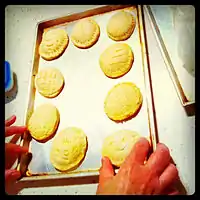Pithivier
A pithivier (English: /pɪtɪˈvjeɪ/;[1] French: pithiviers, IPA: [pitivje] (![]() listen)) is a round, enclosed pie usually made by baking two disks of puff pastry, with filling stuffed in between. It has the appearance of a hump and is traditionally decorated with spiral lines drawn from the top outwards with the point of a knife, and scalloping on the edge. It is named after the French town of Pithiviers, where the dish is commonly assumed to originate.
listen)) is a round, enclosed pie usually made by baking two disks of puff pastry, with filling stuffed in between. It has the appearance of a hump and is traditionally decorated with spiral lines drawn from the top outwards with the point of a knife, and scalloping on the edge. It is named after the French town of Pithiviers, where the dish is commonly assumed to originate.
 | |
| Type | Pie |
|---|---|
| Place of origin | France |
| Region or state | Pithiviers |
| Main ingredients | Puff pastry, frangipane of almond paste |
A small mound of filling is positioned at the centre of the underneath layer of pastry, rather than spread on it, so as to prevent it from leaking during baking. The pie is traditionally finished with a distinct shine to the top of the crust, by egg-washing beforehand, or by caramelising a dusting of confectioner's sugar at the end of baking, or both.
Made for Epiphany, it's similar to the galette des rois.

The filling of the Pithivier is often a sweet frangipane (optionally combined with fruit such as cherry or plum), but savoury pies with vegetable, meat or cheese filling can also be called pithivier.
Notes
- From French Wikipedia: "Le Pithiviers, gâteau of puff pastry filled with almond paste.
